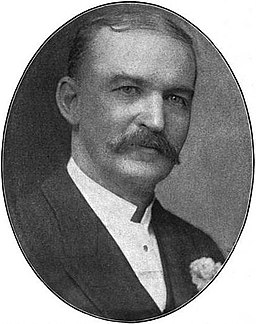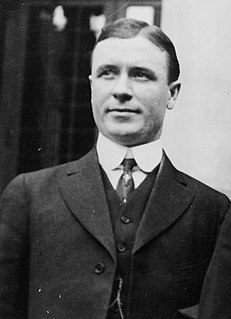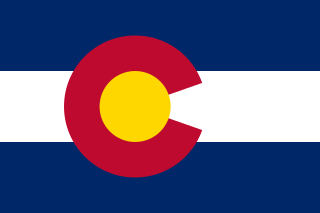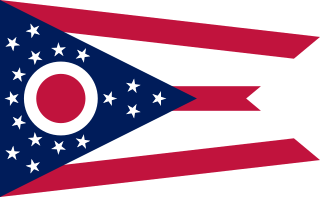
The Western Federation of Miners (WFM) was a radical labor union that gained a reputation for militancy in the mines of the western United States and British Columbia. Its efforts to organize both hard rock miners and smelter workers brought it into sharp conflicts – and often pitched battles – with both employers and governmental authorities. One of the most dramatic of these struggles occurred in the Cripple Creek district in 1903–04, and has been called the Colorado Labor Wars. The WFM also played a key role in the founding of the Industrial Workers of the World in 1905, but left that organization several years later.

James Hamilton Peabody was the 13th and 15th Governor of Colorado, and is noted by some for his public service in Cañon City and by others for his brutality in crushing the miner's strike in Cripple Creek in 1903-4.

Davis Hanson Waite was an American politician. He was a member of the Populist Party, and he served as the eighth Governor of Colorado from 1893 to 1895.

Claude Matthews was the 23rd governor of the U.S. state of Indiana from 1893 to 1897. A farmer, he was nominated to prevent the loss of voters to the Populist Party. The Panic of 1893 occurred just before he took office, leading to severe economic problems during his term. Republicans took the Indiana General Assembly in the 1894 mid-term election and repudiated many of the Democrats' laws, leading to violence in the assembly. A popular party figure when he left office, he was a nominee to run for president at the 1896 Democratic National Convention, but lost his bid for the nomination to William Jennings Bryan.
The bituminous coal miners' strike was an unsuccessful national eight-week strike by miners of bituminous coal in the United States, which began on April 21, 1894.

James John (J.J.) Hagerman was an American industrialist who owned mines, railroads and corporate farms in the American West in the late 19th and early 20th centuries. He was one of the most influential men in territorial New Mexico.
Eben Smith was a successful mine owner, smelting company executive, railroad executive and bank owner in Colorado in the late 19th century and early 20th century.
M.F. Bowers was sheriff of El Paso County, Colorado from 1894 to 1896. Prior to becoming sheriff, Bowers had been a saloon bouncer and a night marshal in the town of Altman, Colorado.
Junius James Johnson was a West Point cadet who became a miner, and later played a significant role in the Cripple Creek miners' strike of 1894.

Frank J. Hayes was an American miner and president of the United Mine Workers of America (UMWA) from 1917 to 1919. A Democrat, he also served as Lieutenant Governor of Colorado in 1937–39.

The Colorado labor wars were a series of labor strikes in 1903 and 1904 in the US state of Colorado, by gold and silver miners and mill workers represented by the Western Federation of Miners (WFM). Opposing the WFM were associations of mine owners and businessmen at each location, supported by the Colorado state government. The strikes were notable and controversial for the accompanying violence, and the imposition of martial law by the Colorado National Guard in order to put down the strikes.

Emma Florence Langdon was born in Tennessee in 1875. She moved to the gold mining district of Cripple Creek, Colorado in 1903. She was an apprentice linotype operator who wrote that "women's place should be in the home and not in public life." In spite of such sentiments, she played a very visible role during some very turbulent times. She and her husband were working at the Victor Daily Record, a pro-union newspaper, during a 1903-04 strike of miners in the Cripple Creek gold fields that erupted into the Colorado Labor Wars. Along with many other union sympathizers, Langdon was forced to leave in 1904, and moved to Denver.

Karl E. Linderfelt was a soldier, mine worker, soldier of fortune, and officer in the Colorado National Guard. He was reported to have been responsible for an attack upon, and the ultimate death of, strike leader Louis Tikas during the Ludlow Massacre. He was the son of librarian Klas August Linderfelt.
The Leadville miners' strike was a labor action by the Cloud City Miners' Union, which was the Leadville, Colorado local of the Western Federation of Miners (WFM), against those silver mines paying less than $3.00 per day. The strike lasted from 19 June 1896 to 9 March 1897, and resulted in a major defeat for the union, largely due to the unified opposition of the mine owners. The failure of the strike caused the WFM to leave the American Federation of Labor (AFL), and is regarded as a cause for the WFM turn toward revolutionary socialism.
The Coeur d'Alene, Idaho, labor confrontation of 1899 was the second of two major labor-management confrontations in the Coeur d'Alene mining district of northern Idaho in the 1890s. Like the first incident, the Coeur d'Alene, Idaho labor strike of 1892, the 1899 confrontation was an attempt by union miners, led by the Western Federation of Miners to unionize non-union mines, and have them pay the higher union wage scale. As with the 1892 strike, the 1899 incident culminated in a dynamite attack that destroyed a non-union mining facility, followed by military occupation of the district.

Adjutant General Sherman M. Bell was a controversial leader of the Colorado National Guard during the Colorado Labor Wars of 1903-04. While Bell received high praise from Theodore Roosevelt and some others, he was vilified as a tyrant by the leadership and the miners of the Western Federation of Miners (WFM).
Eugene D. Engley (1851–1910) was an American attorney and political activist. Engley is best remembered as the 9th Attorney General of the state of Colorado, holding that position as the elected candidate of the People's Party from 1893-94. Engley was also a prominent figure in the Colorado Labor Wars of 1903-04 as an advocate for the striking miners affiliated with the Western Federation of Miners.
The Idaho Springs miners strike of 1903 was a labor strike by members of the Western Federation of Miners (WFM) against gold mines in the vicinity of Idaho Springs, Colorado. It is one of the strikes of 1903-1904 that are collectively known as the Colorado Labor Wars. The union demanded a reduction in the working day to eight hours, without a corresponding reduction in pay. The strike began on 1 May 1903, and was called off on 1 September 1903. The strike is noted for a dynamite attack on the Sun and Moon mine, and the forcible deportation of 19 union officials and union members from the area.















